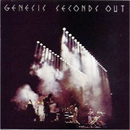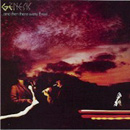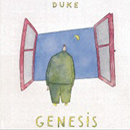by Clayton Walnum

Dividing, into two equal parts, the albums Genesis produced with Phil Collins as the lead singer is tricky, especially if one wants the article titles to be meaningful. I chose to call this second part "The Collins Progressive Years" because the music Genesis produced in this time period (from 1976 to 1982) went from outright progressive to lightly progressive. Granted, a lot of the later music covered here rightly can be termed pop -- but in most cases, it was pop with a progressive edge. The third and last part of this series will be titled "The Collins Pop Years." However, as you'll see then, Genesis never dropped their progressive edge completely. (They just hid it exceedingly well!)
In any case, after Peter Gabriel left the band, most fans feared the demise of Genesis. Luckily, the fans would be in for a pleasant surprise, as the smaller group produced some extraordinary music with Collins fronting the show. It wouldn't be long, though, before pop would figure more and more in Genesis' sound. After all, by 1976, when the first Collins-era album was released, prog was already on its last legs. That Genesis managed to put out so much great music in the latter part of the decade is a tribute to their musical vision and genius. Unfortunately, tributes pay no bills. The times eventually dictated that Genesis either change their direction or disband. Many people would have urged the latter. And so our tale continues?
Trick Of The Tail (1976)
 This was the album for which every Genesis fan waited with both excitement and foreboding. Could Genesis possibly be the same without Peter Gabriel? Surprisingly, not only did Genesis survive, but they put out one of the best albums of their career. From the very progressive "Dance On A Volcano," "Squonk," and "Los Endos" to the magnificence of "Ripples" and "Entangled," A Trick Of The Tail was (and still is) spectacular. (The ending of "Entangled" still gives me goose bumps.) Of course, it didn't hurt that Phil Collins, who took over the lead vocal duties, sounded similar to Gabriel. Casual fans of the group probably didn't even notice the change. Still, even musically, the Genesis sound was intact on this album.
This was the album for which every Genesis fan waited with both excitement and foreboding. Could Genesis possibly be the same without Peter Gabriel? Surprisingly, not only did Genesis survive, but they put out one of the best albums of their career. From the very progressive "Dance On A Volcano," "Squonk," and "Los Endos" to the magnificence of "Ripples" and "Entangled," A Trick Of The Tail was (and still is) spectacular. (The ending of "Entangled" still gives me goose bumps.) Of course, it didn't hurt that Phil Collins, who took over the lead vocal duties, sounded similar to Gabriel. Casual fans of the group probably didn't even notice the change. Still, even musically, the Genesis sound was intact on this album.
What is especially surprising was the continued use of mythological fairy tale-style stories that make up the bulk of the album. Most Genesis fans had always assumed that the source of these stories was Gabriel's imagination. Turns out that there was plenty of imagination to go around. Yes, the band probably wanted to stay true to their previous efforts, and in that quest, they succeeded wonderfully. One final comment: No one writes more powerful progressive ballads than Genesis did. Some utterly gorgeous tracks on this album include "Mad Man Moon," "Entangled," and "Ripples." In fact, it is Genesis' ballads that are the source of inspiration for most of the so-called neo-progressive bands, such as Pendragon and IQ.
Wind & Wuthering (1977)
 In the previous edition of this series, I said "In many ways, Genesis's fourth album, Foxtrot, is Nursery Cryme, Volume 2. Both albums just seem to fit together, almost as if they were recorded at the same time or were intended to be released as a double album." The same can be said for Trick Of The Tail and Wind & Wuthering. They fit together perfectly. Moreover, they came out less than a year apart. Anyone who thought that Trick Of The Tail was just a lucky fluke had to eat his words when Wind & Wuthering hit the stores. Although not as perfect as Trick Of The Tail (more about that in a moment), Wind & Wuthering was another feather in a cap already bulging with wing parts.
In the previous edition of this series, I said "In many ways, Genesis's fourth album, Foxtrot, is Nursery Cryme, Volume 2. Both albums just seem to fit together, almost as if they were recorded at the same time or were intended to be released as a double album." The same can be said for Trick Of The Tail and Wind & Wuthering. They fit together perfectly. Moreover, they came out less than a year apart. Anyone who thought that Trick Of The Tail was just a lucky fluke had to eat his words when Wind & Wuthering hit the stores. Although not as perfect as Trick Of The Tail (more about that in a moment), Wind & Wuthering was another feather in a cap already bulging with wing parts.
This album boasted all the qualities that made Trick Of The Tail great, including complex tracks ("Eleventh Earl Of Mar," "Wot Gorilla?," "All In A Mouse's Night," "In That Quiet Earth") and beautiful progressive ballads ("One For The Vine," "Blood On The Rooftops," "Afterglow"). The track "Unquiet Slumbers For The Sleepers" even sounded like something from The Lamb Lies Down On Broadway, melodic but flirting with the avant garde.
Unfortunately, what the album also had is the classic Genesis lineup's first foray into pop music. I was tempted to say that the song "Your Own Special Way" was just as sappy as the title would lead you to believe. But looking over the lyrics and listening to it again after a long while, it's not quite as sappy as I remember. (The fact that I had to play this song ad nauseam in a professional cover band might have something to do with my opinion, although I had to play "Carry On My Wayward Son" by Kansas just as often, and I still love that piece.) In any case, it was Genesis' first big hit, which made it mighty suspicious from a progressive-rock point of view. Also, this track was a hint of the direction the band would be heading before too long. Still, "Your Own Special Way" notwithstanding, this was one great album.
Seconds Out (1977)
 Pushing Phil Collins to the front of the stage created a dilemma for Genesis. Obviously, while on tour, Collins couldn't be both the front man and the drummer. Neither did Collins want to resign as Genesis' skins man. What to do? For touring purposes, our heroes hired on a second drummer, none other than the famed percussionist from Yes and King Crimson, Bill Bruford. (The terrific Chester Thompson would also often fill this role -- more often, in fact, then Bruford.) When Collins was fronting the group, the second drummer handled the percussion; when the group hit instrumental sections, Collins could jump back to his drums. This new and somewhat unusual stage show screamed for a new live album, and so Seconds Out hit the record racks.
Pushing Phil Collins to the front of the stage created a dilemma for Genesis. Obviously, while on tour, Collins couldn't be both the front man and the drummer. Neither did Collins want to resign as Genesis' skins man. What to do? For touring purposes, our heroes hired on a second drummer, none other than the famed percussionist from Yes and King Crimson, Bill Bruford. (The terrific Chester Thompson would also often fill this role -- more often, in fact, then Bruford.) When Collins was fronting the group, the second drummer handled the percussion; when the group hit instrumental sections, Collins could jump back to his drums. This new and somewhat unusual stage show screamed for a new live album, and so Seconds Out hit the record racks.
The performances documented on this two-CD set cover the whole range of Genesis material, from classic pieces like "The Musical Box" and "Firth Of Fifth" to the new material from Trick Of The Tail and Wind & Wuthering. The sound quality was top-notch, only a bit short of a studio production. The playing was confident and powerful, and, surprisingly, the double drummers didn't clutter the mix. There's not much else to say about this album. No new material, just good stage performances of many classic tracks. You could almost call this The Best of Genesis Live.
And Then There Were Three (1978)
 After the release of Seconds Out, the third album without Gabriel, the Genesis fan community were convinced that their favorite band had survived the loss of their lead singer miraculously well. Then came more bad news: Steve Hackett, the guitarist with the signature style that, along with Tony Banks, practically defined the Genesis sound, was leaving. Again, as with the loss of Gabriel, the band decided not to hire a replacement. Instead, bassist Mike Rutherford took over guitar duties in the studio, with a "hired gun" guitarist, Daryl Stuermer, filling in on tours.
After the release of Seconds Out, the third album without Gabriel, the Genesis fan community were convinced that their favorite band had survived the loss of their lead singer miraculously well. Then came more bad news: Steve Hackett, the guitarist with the signature style that, along with Tony Banks, practically defined the Genesis sound, was leaving. Again, as with the loss of Gabriel, the band decided not to hire a replacement. Instead, bassist Mike Rutherford took over guitar duties in the studio, with a "hired gun" guitarist, Daryl Stuermer, filling in on tours.
Three started off with a roar in the form of the progressive "Down And Out," which leads to the ballad "Undertow." Both tracks were good, but not exceptional, and Hackett's contributions were sorely missed. These criticisms were true for most of the rest of the album as well. More emphasis was now placed on the keyboards, and, although Rutherford was a competent enough guitarist, I suspect even he would have to admit that no one could replace Hackett. In fact, much to his credit, Rutherford didn't even try, eschewing solos and limiting most of his guitar work to rhythm and simple melodic lines.
Although competent, stirring this album wasn't. Moreover, the band here had moved in a slightly less progressive direction. Finally, I don't like the mix, which sounds harsh. If I were in charge of putting together a Genesis box set, I would include only two tracks from And Then There Were Three, those being "Down And Out" and "Scenes From A Night's Dream." (All right, maybe "The Lady Lies," too.)
Duke (1980)
 Duke starts off auspiciously with the powerful opening to "Behind The Lines," but the track soon falls victim to Genesis' new-found pop sensibilities. Now don't get me wrong: I like a well-written pop song as much as anyone, just not from Genesis. To be fair, there were a couple of nicely melancholy moments on this album, such as "Heathaze." Still, a track like "Please Don't Ask" took over as Genesis' sappiest song to date. Did anyone ever believe that they'd hear the line "I Love You" in a Genesis song? The day had come.
Duke starts off auspiciously with the powerful opening to "Behind The Lines," but the track soon falls victim to Genesis' new-found pop sensibilities. Now don't get me wrong: I like a well-written pop song as much as anyone, just not from Genesis. To be fair, there were a couple of nicely melancholy moments on this album, such as "Heathaze." Still, a track like "Please Don't Ask" took over as Genesis' sappiest song to date. Did anyone ever believe that they'd hear the line "I Love You" in a Genesis song? The day had come.
Taken on its own terms, Duke was a good album, maybe even better than good. But the terms you had to accept were that this was not the Genesis who released the miraculous Foxtrot and Selling England By The Pound. Nope, this Genesis was what I like to call "near-prog," the same genre in which I'd place groups like Ambrosia, Crack The Sky, and Saga -- all terrific groups to be sure, but none of which is likely to be found in a progressive-music listener's top 10.
Still, Genesis took its new pop direction all the way to the bank, getting more airplay than ever before, particularly with the infectious songs "Misunderstanding" and "Turn It On Again" (the latter being one of my favorite pop songs from that year). And little in the world turns a person's head faster than a wad of that green stuff, which, in the non-prog world, is a sure measure of success, not to mention an irresistible lure. The only truly progressive tracks on Duke are the closing "Duke's Travels" and "Duke's End," linked songs that made the listener long for the old days.
Abacab (1981)
 After Duke, Genesis was raking in the airplay and the cash. The group's tour venues had gone from small theaters to sold-out arenas. Whether their musical direction was dictated by their hearts or by the lure of riches and international success, I don't know. One thing's for sure, a band like Genesis, who had battled for years in the trenches of progressive music to see little more than critical acclaim, certainly deserved to be rich. Disappointing as it might be to Genesis' die-hard fans, one can hardly blame the group for wanting the success they deserved. And the fact is that they had more fans than ever before. They were just different fans. Anyway, in 1981, progressive music was long dead -- or at least in a coma.
After Duke, Genesis was raking in the airplay and the cash. The group's tour venues had gone from small theaters to sold-out arenas. Whether their musical direction was dictated by their hearts or by the lure of riches and international success, I don't know. One thing's for sure, a band like Genesis, who had battled for years in the trenches of progressive music to see little more than critical acclaim, certainly deserved to be rich. Disappointing as it might be to Genesis' die-hard fans, one can hardly blame the group for wanting the success they deserved. And the fact is that they had more fans than ever before. They were just different fans. Anyway, in 1981, progressive music was long dead -- or at least in a coma.
From the perspective of a prog-rock listener, Abacab would be the first of a long line of mediocre albums, and the last studio album I dare put under the heading "progressive." Truth be told, calling this album progressive is stretching the term about as far as it can go. This album did have a few progressive parts, like the ending of the title song, "Abacab." Also, "Me And Sarah Jane" offered interesting moments and even changed meter here and there. Even more interesting was the track "Dodo/Lurker," which was reminiscent of Trick Of The Tail's "Squonk" and must have been a shock to Genesis' new fans who knew little of the group's roots. On the other hand, Genesis reached an all-time low (by just about anyone's criteria) with the novelty track "Who Dunnit?" a truly horrible thing that should have been abandoned in the studio. I suspect this, uh, song was the last straw for die-hard Genesis fans and a throw-away even for the group's new pop fans. The end of an era.
Three Sides Live (1982)
 I have little to say about this release, except that it's wonderfully well recorded and probably pleased most of Genesis's new pop-oriented fans. There are only three truly progressive pieces on this double-CD live outing (with a few studio tracks), those being "Dodo," "In The Cage," and the prosaic "Afterglow." A couple of prog close-calls in the guise of "Me And Sarah Jane" and the studio recording "Evidence Of Autumn" also present themselves here. The rest is mostly pop.
I have little to say about this release, except that it's wonderfully well recorded and probably pleased most of Genesis's new pop-oriented fans. There are only three truly progressive pieces on this double-CD live outing (with a few studio tracks), those being "Dodo," "In The Cage," and the prosaic "Afterglow." A couple of prog close-calls in the guise of "Me And Sarah Jane" and the studio recording "Evidence Of Autumn" also present themselves here. The rest is mostly pop.
Stay tuned for part III: "The Collins Pop Years."
Tricks Of The Tale, Part 1 | Tricks Of The Tale, Part 3
Links: www.genesis-music.com
Copyright © by ProgressiveWorld.net All Right Reserved.
Published on: 2002-09-08 (5677 reads)

